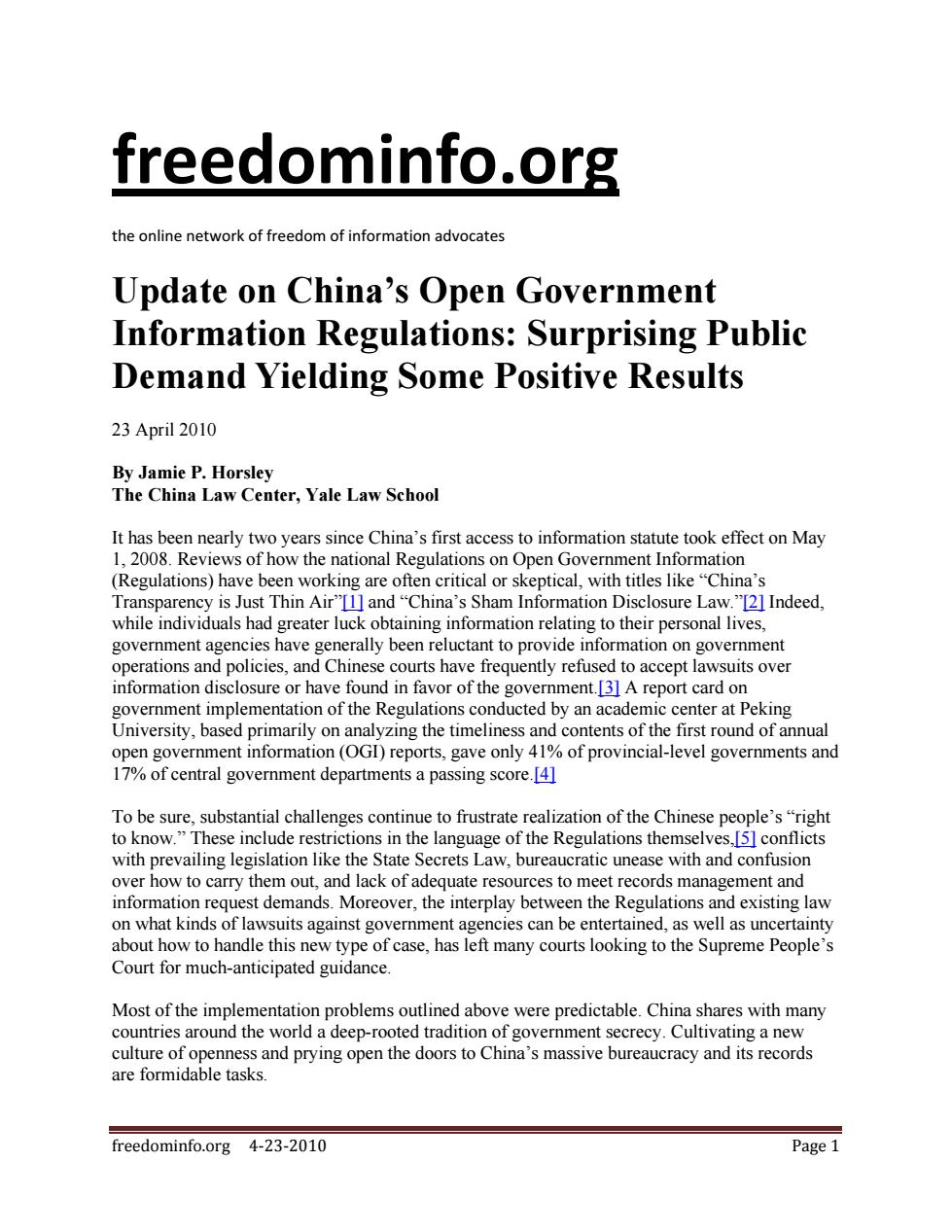正在加载图片...

freedominfo.org the online network of freedom of information advocates Update on China's Open Government Information Regulations:Surprising Public Demand Yielding Some Positive Results 23 April 2010 By Jamie P.Horsley The China Law Center,Yale Law School It has been nearly two years since China's first access to information statute took effect on May 1,2008.Reviews of how the national Regulations on Open Government Information (Regulations)have been working are often critical or skeptical,with titles like"China's Transparency is Just Thin Air"[1]and "China's Sham Information Disclosure Law."[2]Indeed, while individuals had greater luck obtaining information relating to their personal lives, government agencies have generally been reluctant to provide information on government operations and policies,and Chinese courts have frequently refused to accept lawsuits over information disclosure or have found in favor of the government.[3]A report card on government implementation of the Regulations conducted by an academic center at Peking University,based primarily on analyzing the timeliness and contents of the first round of annual open government information(OGI)reports,gave only 41%of provincial-level governments and 17%of central government departments a passing score.[4] To be sure,substantial challenges continue to frustrate realization of the Chinese people's"right to know."These include restrictions in the language of the Regulations themselves,[5]conflicts with prevailing legislation like the State Secrets Law,bureaucratic unease with and confusion over how to carry them out,and lack of adequate resources to meet records management and information request demands.Moreover,the interplay between the Regulations and existing law on what kinds of lawsuits against government agencies can be entertained,as well as uncertainty about how to handle this new type of case,has left many courts looking to the Supreme People's Court for much-anticipated guidance Most of the implementation problems outlined above were predictable.China shares with many countries around the world a deep-rooted tradition of government secrecy.Cultivating a new culture of openness and prying open the doors to China's massive bureaucracy and its records are formidable tasks. freedominfo.org 4-23-2010 Page 1freedominfo.org 4‐23‐2010 Page 1 freedominfo.org the online network of freedom of information advocates Update on China’s Open Government Information Regulations: Surprising Public Demand Yielding Some Positive Results 23 April 2010 By Jamie P. Horsley The China Law Center, Yale Law School It has been nearly two years since China’s first access to information statute took effect on May 1, 2008. Reviews of how the national Regulations on Open Government Information (Regulations) have been working are often critical or skeptical, with titles like “China’s Transparency is Just Thin Air”[1] and “China’s Sham Information Disclosure Law.”[2] Indeed, while individuals had greater luck obtaining information relating to their personal lives, government agencies have generally been reluctant to provide information on government operations and policies, and Chinese courts have frequently refused to accept lawsuits over information disclosure or have found in favor of the government.[3] A report card on government implementation of the Regulations conducted by an academic center at Peking University, based primarily on analyzing the timeliness and contents of the first round of annual open government information (OGI) reports, gave only 41% of provincial-level governments and 17% of central government departments a passing score.[4] To be sure, substantial challenges continue to frustrate realization of the Chinese people’s “right to know.” These include restrictions in the language of the Regulations themselves,[5] conflicts with prevailing legislation like the State Secrets Law, bureaucratic unease with and confusion over how to carry them out, and lack of adequate resources to meet records management and information request demands. Moreover, the interplay between the Regulations and existing law on what kinds of lawsuits against government agencies can be entertained, as well as uncertainty about how to handle this new type of case, has left many courts looking to the Supreme People’s Court for much-anticipated guidance. Most of the implementation problems outlined above were predictable. China shares with many countries around the world a deep-rooted tradition of government secrecy. Cultivating a new culture of openness and prying open the doors to China’s massive bureaucracy and its records are formidable tasks